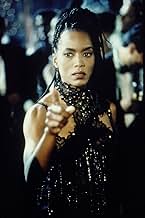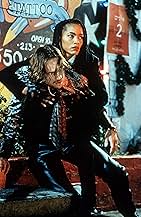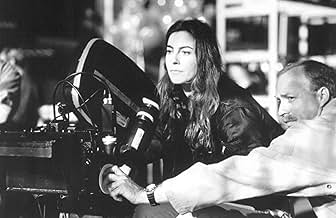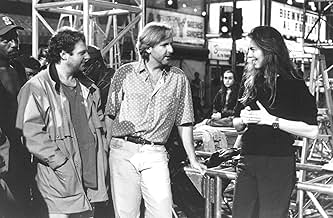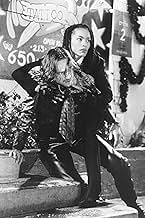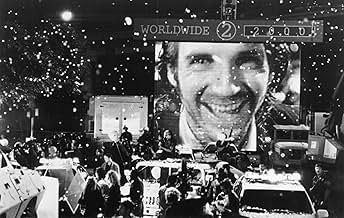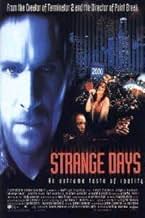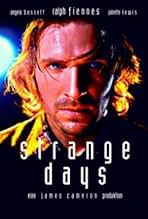Un ex poliziotto diventato delinquente scopre per sbaglio un complotto a Los Angeles nel 1999.Un ex poliziotto diventato delinquente scopre per sbaglio un complotto a Los Angeles nel 1999.Un ex poliziotto diventato delinquente scopre per sbaglio un complotto a Los Angeles nel 1999.
- Regia
- Sceneggiatura
- Star
- Premi
- 2 vittorie e 4 candidature totali
Recensioni in evidenza
Probably one of the best big-budget sci-fi films to never reach a big audience. Written and produced by James Cameron and expertly directed by Kathryn Bigelow, this film is more noir than actual sci-fi - although the sci-fi elements are important. With a great cast and an amazing atmosphere throughout, this is one not to miss for fans of thrillers, film noir, sci-fi and especially the subgenre knwon as cyberbunk. 8 stars out of 10.
In case you're interested in more underrated masterpieces, here's a list with some of my favorites:
imdb.com/list/ls070242495
In case you're interested in more underrated masterpieces, here's a list with some of my favorites:
imdb.com/list/ls070242495
Unfortunately, this film failed at the box-offices, although it´s one of the greatest masterpieces of the 90s. The first time I saw "Strange Days" was about five years ago, and then over and over again. If you think Ralph Fiennes is only able to play sensitive and problematic characters watch this: it´s his most unusual, but one of the best performances in his career - a performance of a coolness you only would expect from Samuel L. Jackson. Angela Bassett is one of the toughest women cinema has ever seen and Juliette Lewis, Tom Sizemore, Glenn Plummer, William Fichtner - every single role is casted perfectly...
"Strange Days" is thriller, drama and big city ballad in one piece. I can´t remember any movie that reflects the philosophy of life of Generation X better than this one. Lenny deals with the "Squids" which are the experiences and emotions of men saved on a mini disc. Emotions as a product, a drug - a compensation of modern life for the growing loneliness and anonymity. The only possibility for weak persons like Lenny to feel real. A movie like "Fight Club" wouln´t have been possible without "Strange Days"; other releases like "The Cell" or even Scorsese´s "Bringing out the dead" copied the incomparable make. Although this film is older than six years it hasn´t lost anything explosive effects, what is connected with the video clip style this movie has, which gives "Strange Days" a touch of being ageless. The two most brilliant scenes are the opening sequence - the robbery in the Chinese restaurant - and the showdown down in the streets at the millenium party. Also the soundtrack (Deep Forest, Peter Gabriel, Skunk Anansia, Strange Fruit...) is one of the best I´ve ever heard, what makes "Strange Days" an unforgettable experience for every watcher. (10/10)
"Strange Days" is thriller, drama and big city ballad in one piece. I can´t remember any movie that reflects the philosophy of life of Generation X better than this one. Lenny deals with the "Squids" which are the experiences and emotions of men saved on a mini disc. Emotions as a product, a drug - a compensation of modern life for the growing loneliness and anonymity. The only possibility for weak persons like Lenny to feel real. A movie like "Fight Club" wouln´t have been possible without "Strange Days"; other releases like "The Cell" or even Scorsese´s "Bringing out the dead" copied the incomparable make. Although this film is older than six years it hasn´t lost anything explosive effects, what is connected with the video clip style this movie has, which gives "Strange Days" a touch of being ageless. The two most brilliant scenes are the opening sequence - the robbery in the Chinese restaurant - and the showdown down in the streets at the millenium party. Also the soundtrack (Deep Forest, Peter Gabriel, Skunk Anansia, Strange Fruit...) is one of the best I´ve ever heard, what makes "Strange Days" an unforgettable experience for every watcher. (10/10)
The answer being, of course, yes I am impressed.
What a thoroughly enjoyable film Strange Days is. Fast-moving and occasionally violent, it's not high art but then neither is it dumbed-down fodder and it has much to commend it. The central plot revolves around an ex-cop (Fiennes, doing a - to my ears anyway - convincing American accent) peddling FBI technology on the black market. The SQUID technology (Super conducting QUantum Interface Device) electronically absorbs information from the central cortex and allows users to experience the thrill of another's sensations - be it murder, sex, robbery, etc. Of course, this central idea, while fascinating, does derive pretty much directly from a Twilight Zone episode. Were this a "classic" Zone episode from the b/w era, then people would have picked it up straight away and the game would be over. As it is, the inspiration comes from one of the colour Twilight Zone episodes which had even less viewers than Strange Days and so the movie can rest assured it is safe in obscurity. (Give up? Okay, it was episode 23, season three, 1989, "The Mind of Simon Foster". I'm an anorak, I know these things).
But whether such were intentional is pretty much irrelevant as the magpie technique of this film takes from many texts and builds something greater than the parts. One of the two greatest science fiction films of the 90s - the other being the excellent "Twelve Monkeys" - both have built-in sell-by dates by fixing their time period in a very near locale. Hence while the supposed date of Monkeys is long past at 98, this film now becomes a historical document as of New Year's Eve 1999. But then does it follow that we will stop watching 2001 in 2002? Hopefully not, and Strange Days is one that too deserves to be revisited in years to come.
The reason why I commend it most is its rewarding political stance. The development that gets adhered onto the "Squid" plot directly references the beating of Rodney King. Such contemporary referencing may again date it as quickly as the '99 setting, but then we also have Angela Bassett as a very empowered, yet caring black woman. Note how she and Lenny have exchanged traditional gender roles in this film, yet this feels not like some "macho woman" schtick but genuine characterisation. Lenny is a likeable, wisetalking street peddler who spends the film as a human punchbag. Gone is the cliched jaw-breaking action man role for him, instead his only retort to violence is "I'll give you my Rolex". This sense of, if you like, PC-ness, can also be evidenced with the lesbian couple kissing as the year 2000 breaks, or the (one scene only, admittedly) appearance of a disabled man as a central character.
However, the boundary-pushing elements of this movie are tainted by the appearance of Juliet Lewis in the film. A capable actress, her only role appears to be as a receptacle for various men's sexual needs or to gratuitously expose her breasts on multiple occasions. This is a great shame, and a pity that a film which has such high intentions in almost every other area should fall back on unfortunate portrayal.
The dialogue is pitched just about right without being particularly clever, though occasionally it stalls. "You're like a goddamn cruise missile, targetted on making it", Fiennes tells Faith (Lewis) at one point, managing to keep a straight face. Later, Bassett must endure having to say "These are used emotions. It's time to trade them in" and not use her gun on the scriptwriter. When the credits do roll, it's perhaps no surprise that James Cameron was the co-writer, as its slight perfunctory, by-the-numbers stance often reminds one of the machinations of "Titanic". Tom Sizemore as Max is every inch the one-dimensional Cameron "character", while plot twists sometimes feel heavily engineered. Maybe Jay Cocks is responsible for the script's more "human" feel, with particular note going to the moral debate of whether or not to expose the LAPD's murder of an influential black rapper. The two leads debate (internally, as well as verbally, a first for a Cameron movie) the implications and the possible consequences of such an action. Despite its flirtation with the mainstream, Strange Days is a film that dares to pervert the traditional course of Hollywood into a future that is worth seeing. Perhaps predictably, it made little impact at the box office.
What a thoroughly enjoyable film Strange Days is. Fast-moving and occasionally violent, it's not high art but then neither is it dumbed-down fodder and it has much to commend it. The central plot revolves around an ex-cop (Fiennes, doing a - to my ears anyway - convincing American accent) peddling FBI technology on the black market. The SQUID technology (Super conducting QUantum Interface Device) electronically absorbs information from the central cortex and allows users to experience the thrill of another's sensations - be it murder, sex, robbery, etc. Of course, this central idea, while fascinating, does derive pretty much directly from a Twilight Zone episode. Were this a "classic" Zone episode from the b/w era, then people would have picked it up straight away and the game would be over. As it is, the inspiration comes from one of the colour Twilight Zone episodes which had even less viewers than Strange Days and so the movie can rest assured it is safe in obscurity. (Give up? Okay, it was episode 23, season three, 1989, "The Mind of Simon Foster". I'm an anorak, I know these things).
But whether such were intentional is pretty much irrelevant as the magpie technique of this film takes from many texts and builds something greater than the parts. One of the two greatest science fiction films of the 90s - the other being the excellent "Twelve Monkeys" - both have built-in sell-by dates by fixing their time period in a very near locale. Hence while the supposed date of Monkeys is long past at 98, this film now becomes a historical document as of New Year's Eve 1999. But then does it follow that we will stop watching 2001 in 2002? Hopefully not, and Strange Days is one that too deserves to be revisited in years to come.
The reason why I commend it most is its rewarding political stance. The development that gets adhered onto the "Squid" plot directly references the beating of Rodney King. Such contemporary referencing may again date it as quickly as the '99 setting, but then we also have Angela Bassett as a very empowered, yet caring black woman. Note how she and Lenny have exchanged traditional gender roles in this film, yet this feels not like some "macho woman" schtick but genuine characterisation. Lenny is a likeable, wisetalking street peddler who spends the film as a human punchbag. Gone is the cliched jaw-breaking action man role for him, instead his only retort to violence is "I'll give you my Rolex". This sense of, if you like, PC-ness, can also be evidenced with the lesbian couple kissing as the year 2000 breaks, or the (one scene only, admittedly) appearance of a disabled man as a central character.
However, the boundary-pushing elements of this movie are tainted by the appearance of Juliet Lewis in the film. A capable actress, her only role appears to be as a receptacle for various men's sexual needs or to gratuitously expose her breasts on multiple occasions. This is a great shame, and a pity that a film which has such high intentions in almost every other area should fall back on unfortunate portrayal.
The dialogue is pitched just about right without being particularly clever, though occasionally it stalls. "You're like a goddamn cruise missile, targetted on making it", Fiennes tells Faith (Lewis) at one point, managing to keep a straight face. Later, Bassett must endure having to say "These are used emotions. It's time to trade them in" and not use her gun on the scriptwriter. When the credits do roll, it's perhaps no surprise that James Cameron was the co-writer, as its slight perfunctory, by-the-numbers stance often reminds one of the machinations of "Titanic". Tom Sizemore as Max is every inch the one-dimensional Cameron "character", while plot twists sometimes feel heavily engineered. Maybe Jay Cocks is responsible for the script's more "human" feel, with particular note going to the moral debate of whether or not to expose the LAPD's murder of an influential black rapper. The two leads debate (internally, as well as verbally, a first for a Cameron movie) the implications and the possible consequences of such an action. Despite its flirtation with the mainstream, Strange Days is a film that dares to pervert the traditional course of Hollywood into a future that is worth seeing. Perhaps predictably, it made little impact at the box office.
Reading all these glowing reviews, one might get the impression that Strange Days really blew people away in the 90's, but what about now? Is it actually a "good" movie that holds up outside of nostalgia for new viewers? I don't think so.
I'll admit, the first-person memory sequences were cutting-edge at the time and I can see how the original premise, over-the-top story, fun soundtrack, and cyberpunk aesthetics have helped Strange Days amass a cult following over the years. It also clearly influenced better sci-fi movies like The Matrix, so there are definitely some great ideas here. However, once you get past the initial shock value this film offers, you may start to realize why James Cameron let his wife direct it instead.
While I did enjoy the first half-hour of Strange Days, the story ran out of steam fast and I quickly realized there was no engine to keep it going. The script is poorly paced and bloated with unnecessary scenes carried out by flat, forgettable characters. Additionally, the bad writing was made worse by a general lack of chemistry among the cast, making relationships feel unnatural and forced. By this I mean with the exception of Angela Bassett, every other actor looked like they were only there for the paycheck. A result was that whenever the action kicked in or a major plot twist happened, I didn't care. The scenes had zero emotional impact for me because the stakes never felt high enough to matter, even to the point that the big "conspiracy" reveals fell flat.
Do I regret watching Strange Days? Not completely. I may not have enjoyed it as much as I hoped, but it's still such a 90's movie at its core that I appreciated how it works as a time capsule, capable of transporting you back to a simpler time where movies could just be movies. What you see in Strange Days is what you get and nothing more, which isn't so bad when you consider there's literally a scene where Angela Bassett kicks a crooked cop in the balls. Can you imagine such a scene being made today without a political uproar? Impossible!
Overall, Strange Days is far from the worst movie I've ever seen, but I can't recommend it to anyone besides nostalgic cyberpunk fans. That is why Strange Days gets a 5/10 from me.
I'll admit, the first-person memory sequences were cutting-edge at the time and I can see how the original premise, over-the-top story, fun soundtrack, and cyberpunk aesthetics have helped Strange Days amass a cult following over the years. It also clearly influenced better sci-fi movies like The Matrix, so there are definitely some great ideas here. However, once you get past the initial shock value this film offers, you may start to realize why James Cameron let his wife direct it instead.
While I did enjoy the first half-hour of Strange Days, the story ran out of steam fast and I quickly realized there was no engine to keep it going. The script is poorly paced and bloated with unnecessary scenes carried out by flat, forgettable characters. Additionally, the bad writing was made worse by a general lack of chemistry among the cast, making relationships feel unnatural and forced. By this I mean with the exception of Angela Bassett, every other actor looked like they were only there for the paycheck. A result was that whenever the action kicked in or a major plot twist happened, I didn't care. The scenes had zero emotional impact for me because the stakes never felt high enough to matter, even to the point that the big "conspiracy" reveals fell flat.
Do I regret watching Strange Days? Not completely. I may not have enjoyed it as much as I hoped, but it's still such a 90's movie at its core that I appreciated how it works as a time capsule, capable of transporting you back to a simpler time where movies could just be movies. What you see in Strange Days is what you get and nothing more, which isn't so bad when you consider there's literally a scene where Angela Bassett kicks a crooked cop in the balls. Can you imagine such a scene being made today without a political uproar? Impossible!
Overall, Strange Days is far from the worst movie I've ever seen, but I can't recommend it to anyone besides nostalgic cyberpunk fans. That is why Strange Days gets a 5/10 from me.
"Strange Days" is a unique science fiction and mystery film. Set in Los Angeles during the last two or so days prior to the new millennium, the cast is helmed by Ralph Fiennes as the charming, brave, but shady Lenny Nero. Lenny is a former LAPD officer who loses his job for mostly unknown reasons. He then becomes a black market hustler who sells people's recorded memories for profit. For the most part, these recorded memories are either violent or sexual in nature.
Angela Bassett does a great job complementing Fiennes' "Lenny" character in her role as Macy, Lenny's close friend who makes a more legitimate living as a limo driver and security specialist. Lenny and Macy soon become embroiled in a murder mystery involving corruption within both the LAPD and the music industry. This seemingly ever-deepening mystery also involves Lenny's other close friend, Tom Sizemore's character "Max". Max is a private eye who, despite seeming to be very well-intentioned, is just as shady as Lenny. Juliette Lewis rounds out the cast as "Faith", Lenny's troubled and devious rock singer ex-girlfriend.
Besides the awesome and well-acted performances, what made this movie stand out to me is just how on the nose some of the background references are in it. References to an economic collapse, increasing gas prices, and strained relations between the police and minorities make this a very odd foreshadowing of the actual real-life future.
In conclusion, great acting, a very deep and interesting storyline, and great cultural references make this a very highly recommended film.
Angela Bassett does a great job complementing Fiennes' "Lenny" character in her role as Macy, Lenny's close friend who makes a more legitimate living as a limo driver and security specialist. Lenny and Macy soon become embroiled in a murder mystery involving corruption within both the LAPD and the music industry. This seemingly ever-deepening mystery also involves Lenny's other close friend, Tom Sizemore's character "Max". Max is a private eye who, despite seeming to be very well-intentioned, is just as shady as Lenny. Juliette Lewis rounds out the cast as "Faith", Lenny's troubled and devious rock singer ex-girlfriend.
Besides the awesome and well-acted performances, what made this movie stand out to me is just how on the nose some of the background references are in it. References to an economic collapse, increasing gas prices, and strained relations between the police and minorities make this a very odd foreshadowing of the actual real-life future.
In conclusion, great acting, a very deep and interesting storyline, and great cultural references make this a very highly recommended film.
Lo sapevi?
- QuizDirector Kathryn Bigelow found that no existing camera system could accomplish the shots necessary for the point-of-view sequences, so the research division of Lightstorm Entertainment (the company of writer/producer James Cameron, who was Bigelow's husband at the time) spent a full year designing and fabricating a special camera for the production. Weighing only 8 pounds, the 35mm camera literally fit in the palm of the hand and featured interchangeable lenses, remote follow focus, and video assist (necessary since the camera had no viewfinder). The camera was then mounted on a SteadiCam-style portable rig, which gave the camera stability and mobility similar to the human eye.
- BlooperThe safety cable is visible during the final 10 or 20 feet of Max's fall.
- Versioni alternativeThe older special edition laserdisc and DVD are the same. Both formats feature two deleted scenes and other extras. The solitary difference is that the laserdisc contains the Skunk Anansie music video for "Selling Jesus", which was not included on the US DVD release. The only DVD to feature the music video is the German special edition.
- ConnessioniEdited into Strange Days: Deleted Scenes (2002)
I più visti
Accedi per valutare e creare un elenco di titoli salvati per ottenere consigli personalizzati
- How long is Strange Days?Powered by Alexa
Dettagli
- Data di uscita
- Paese di origine
- Lingue
- Celebre anche come
- Días extraños
- Luoghi delle riprese
- Azienda produttrice
- Vedi altri crediti dell’azienda su IMDbPro
Botteghino
- Budget
- 42.000.000 USD (previsto)
- Lordo Stati Uniti e Canada
- 7.959.291 USD
- Fine settimana di apertura Stati Uniti e Canada
- 31.062 USD
- 8 ott 1995
- Lordo in tutto il mondo
- 7.960.304 USD
- Tempo di esecuzione2 ore 25 minuti
- Colore
- Mix di suoni
- Proporzioni
- 1.78 : 1(original/open matte)
Contribuisci a questa pagina
Suggerisci una modifica o aggiungi i contenuti mancanti

Divario superiore
By what name was Strange Days (1995) officially released in Canada in French?
Rispondi

